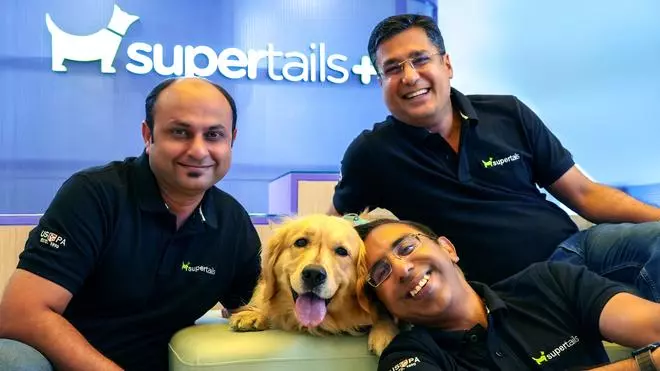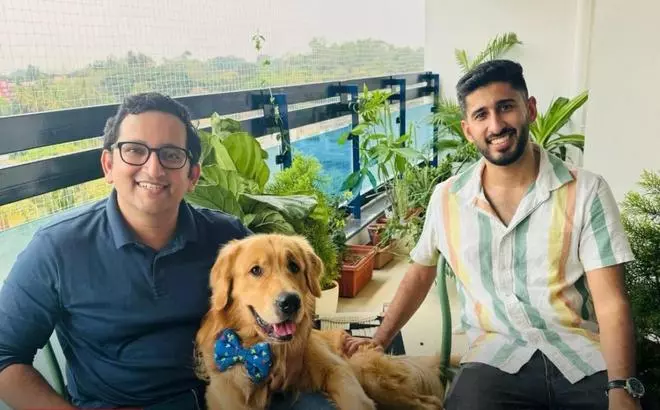When Niharika brought home a husky puppy, Bowwie, during the lockdown, she never imagined how quickly he would become the centre of her world. A first-time pet parent, she wanted the best for Bowwie — premium food, regular check-ups, and a sparkling coat. But managing his grooming needs soon proved to be an ordeal.
“I tried bathing him at home once,” Niharika recalls with a laugh. “By the end, he was clean but my entire bathroom was a mess, and I was drenched!” Scouting for an easier alternative, she discovered a host of pet grooming salons near her apartment. Now, she and Bowwie are regulars at one of these salons, soaking up the convenience and care on offer.
As pets are increasingly treated as extended members of families, which spare no expense in lavishing creature comforts on them, pet care is a rapidly growing business segment in India, marked by the entry of several startups in recent times.
Prayag Mohanty, a principal at venture capital firm Fireside Ventures, draws parallels with the explosion in the pet care market in China in the previous decade, driven by factors such as rising per capita GDP, people marrying later or choosing to remain single while seeking pet companionship, and a rising number of families with double income and no kids or a single kid. “Further, Covid was a major tailwind for this segment, as urban pet adoption rates shot up during this period,” he says.
Market intelligence platform Tracxn reports that India’s pet care startup sector secured $121.3 million funding during 2019-24. Funding peaked in 2021 at $56.7 million across 13 rounds. In 2024, it stood at $17.4 million.

Supertails co-founders (left to right) Varun Sadana, Aman Tekriwal, and Vineet Khanna
The sector is projected to clock annual revenue of around $1.2 billion.
Over the next 8-10 years, Mohanty foresees a predominance of first-time pet parents, who would need guidance and support in this journey. “Interestingly, we’re also seeing a significant share of demand coming from non-metro cities, which shows these secular trends have spread across the country,” he adds.
Key players
Rakesh Santhapur, co-founder of veterinary hospital chain Dr. Paws, says there are two main categories within the pet care market — products (food, cleaning supplies, accessories like toys, and so on); and services (grooming and boarding). “Other adjacent services like pet walking and training are also gaining traction,” he says.
Founded in June 2021, online pet store Supertails describes itself as a “partner in pet parenting”. As its co-founder Vineet Khanna explains, “The new-age pet parent has two types of needs. One is transactional, where they need food, accessories, health advice, vaccinations and medicine for their pets. The non-transactional needs are knowledge about raising a pet because most are first-time pet parents. Like with a (human) baby, there are no grandparents to hand down wisdom across generations. We brought all these elements together to build an ecosystem that handholds pet parents.”
Business models
Dr. Paws provides all pet-related services under one roof, including surgeries, diagnostics, consultations, vaccinations, hydrotherapy, grooming, retail and pharmacy.
“Currently, we have three clinics in Bengaluru and 17 doctors. The first clinic opened in July 2024. We’ll venture into Hyderabad in the first half of this year,” says Santhapur.

Dr. Paws co-founders Rakesh Santhapur (left) and Udit Gadkary
For Supertails, the pet food category accounts for two-thirds of its overall revenue.
Khanna says there are two reasons for this — a spurt in pet adoptions; and the rising number of new pet parents, mainly Gen Z and millennials, who are more open to choices and invested in the nutritional needs of their pet.
Non-food and healthcare categories make up the rest of the startup’s business, he says. “Close to 20 per cent of our business comes from healthcare products, and 15 per cent from accessories and other non-food products.”
Supertails plans to have an offline presence too, through a chain of clinics in Bengaluru. “The healthcare category of the business requires a more hands-on approach, which brings in more compassion. That’s why we are exploring an offline expansion through clinics,” Khanna says.
Launched in 2022, Gurugram-based pet care startup Sploot offers subscription-based fresh food delivery and dog walking services.
“We’ve expanded to 30 cities… we’re slowly launching in more cities,” says Garima Kaushal, co-founder of Sploot.
She says product sales account for about 30 per cent of revenue, with the rest coming from services, largely based on subscriptions.
“With (pet) walking, we primarily have subscriptions, because it is a daily service — 95 per cent of the customer base is on monthly subscriptions. They typically start with one walk and gradually shift to a week or month of walks. It’s a level of comfort that builds with the walker as well,” she says. The company is trying to replicate the subscription model for grooming services too.
Challenges
The pet care industry sees itself as not just a growth category, but also a habit-forming one that is immune to disruptions like the Covid pandemic.
However, a huge challenge it faces is the lack of a skilled workforce, says Santhapur. “We need three kinds of manpower — doctors, groomers and veterinary technicians or assistants, who are equivalent to nurses. We can hire people with the required attitude, enthusiasm and empathy for pets, put them through a three- to five-month course on animal handling, and train them for those roles,” he says.




